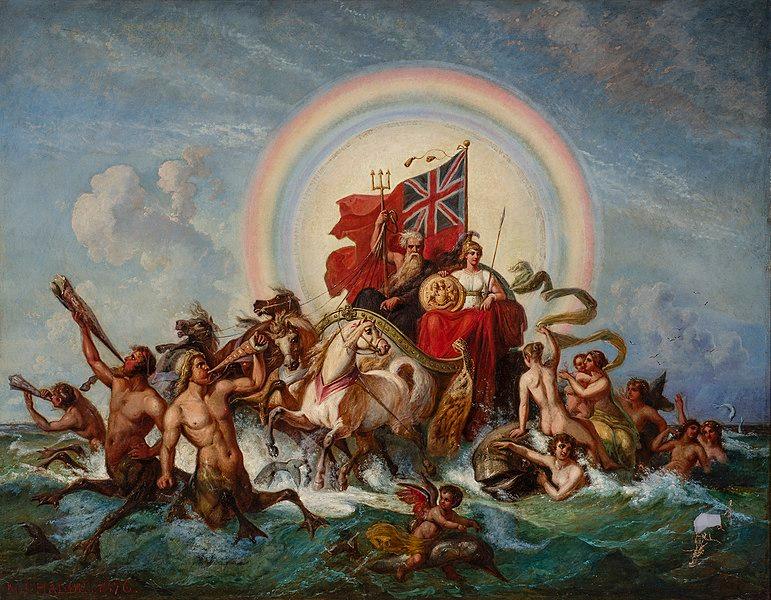Changing Attitudes Towards the British Empire

What impression of Britain does the painter want to convey? Govva: Nicholas Habbe / Offentlig eie
Debates about the British Empire used to be fairly non-existent outside academic circles. However, this has changed in recent years, and today we see a growing awareness of Britain's colonial past and the impact it had, both on Britain and on its former colonies. The question of the merits of the Empire divides the British people: There are many who believe that the former colonies are better off today than they would have been without the Empire, and that Britain should be proud of its colonial legacy. Others point out that it was an economic system designed to benefit the colonisers at the expense of the colonised peoples, and they see it as a shameful chapter in their history.
The views on the history of the British Empire are largely divided along party lines. The conservative right often refers to the Empire as an example of national accomplishment and British exceptionalism. People on the left emphasise that the Empire oppressed peoples and used brute force to amass land and wealth. They also state that more should be done to educate the public about the damaging consequences of colonialism.
Many British people have an overly rose-tinted view of the Empire. We see this clearly in a YouGov poll from 2014, where 59% of the respondents stated that the British Empire was something to be proud of. Only 19% described it as a source of shame. However, the support for the former Empire has since changed. Several polls have been conducted between 2014 and 2020, and they all show a significant drop in the number of people expressing pride in the Empire. In a similar YouGov poll from 2016, 44% expressed a sense of pride, while in 2019, the numbers had fallen to 32%.
However, the decline in support of the Empire has not resulted in an increase of people feeling ashamed of Britain’s imperial past. Here, the numbers are fairly stable, hovering between 16 and 20%. Instead, pride in the Empire has been replaced by ambivalence or perhaps even indifference, with the largest group of respondents, 37%, having the view that the Empire is neither something to be proud of nor ashamed of.
Again, we see differences in opinion that follow traditional party lines: 53% of Conservative voters feel the Empire is something to be proud of and that countries colonised by Britain are better off for the experience. Only 21% of Labour voters feel the same way.
It is also interesting to observe that a 2020 YouGov poll shows that 51% of people who voted to leave the EU in the Brexit referendum believe that Britain’s former colonies benefited from their inclusion in the Empire, compared with 22% of the voters who wanted to remain in the EU. This suggests that people who have a more positive view of the British Empire also have greater faith that the United Kingdom does not need the partnership of European countries.
Despite a decrease in numbers of people feeling proud of the former Empire, as many as 32% think that the colonised countries were better off during the Empire. Also, the number of people who are ambivalent to the legacy of the Empire (37%) is high. Critics claim that this reveals a deep ignorance about the realities of the British Empire and the lasting effects of colonialism for people of colour in Britain.
A lack of coherent teaching in British schools about the British Empire could bear some of the responsibility. Colonial history is a part of the National Curriculum; it states that children should learn "how Britain has influenced and been influenced by the wider world". However, unlike most other European countries, Britain does not require students to study history after the age of fourteen. This leaves little room for nuance and for a critical view of the British Empire. Also, each school has a certain flexibility in what they choose to focus on, and teaching about the Empire is often not systematic enough. As a result, many students will not learn nearly enough about this pivotal period in British history.

In 2019, as part of their general election manifesto, the Labour Party pledged to
conduct an audit of the impact of Britain’s colonial legacy to understand our contribution to the dynamics of violence and insecurity across regions previously under British colonial rule.
They wanted to introduce a more critical view of British history in schools, and Jeremy Corbyn, who at that time was leader of the Labour Party, stated that it was important to integrate ‘the historical injustices of colonialism’ into the National Curriculum.
However, this led to reactions among some Conservative politicians who accused Labour of putting ideology above children’s education. Conservative MP Tom Loughton claimed that Corbyn was "ashamed" of his own country, and more interested in "talking down" Britain than in celebrating "the immense amount of good we have done in the world over many centuries". This criticism was mirrored by Conservative MP Andrew Rosindale who stated that “What Jeremy Corbyn wants to do is talk down our country. We don’t want the next generation growing up having been brainwashed into hating this country.”
The question 'should the British Empire be a source of pride or shame?' is very simplistic; the history and legacy of the British Empire is more complex than that. The Empire was responsible for some of the worst atrocities committed by man, including genocide and slavery, and for many peoples the British Empire meant loss of land, discrimination, and prejudice. But during the colonial period, there were also important innovations in medical care, education, technology, and infrastructure.
What is certain is that a failure in educating the British public about the brutality and cruelty of the Empire will not result in anything good. Only seeing one side of the story will only perpetuate negative feelings towards other peoples, cultures, and countries. However, understanding how the Empire has shaped British history is, in fact, hugely beneficial for increasing tolerance and respect for other countries - and also for the diverse communities that exist in Britain today. It could help create a feeling of empathy for other people and reduce racism and discrimination, at home and abroad.
Guoskevaš sisdoallu
Tasks related to the text 'Changing Attitudes Towards the British Empire'.